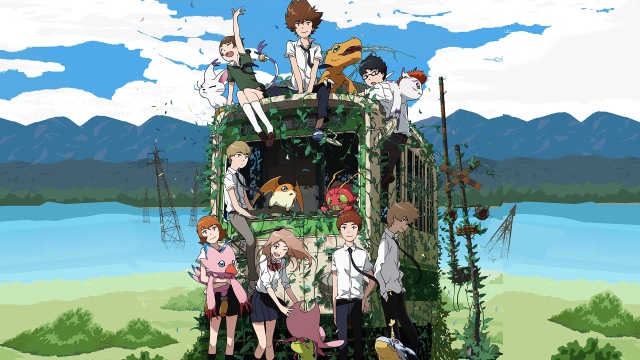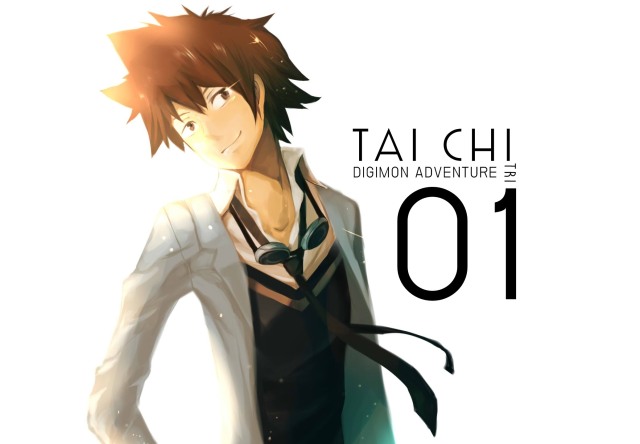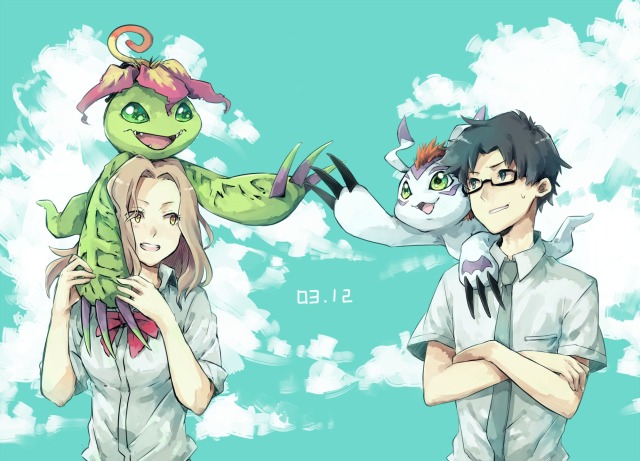
With the premiere of the fourth instalment of the Digimon Tri series, named Loss (喪失 Sōshitsu), I wanted to write about Digimon and the thrill of reviving a much beloved show in the right way, at the right time and for all the right reasons. Firstly, I have to admit that I have been a huge fan of the original Digimon series. For anyone who doesn’t know what this series is about, I will say that it is the journey of eight kids from Japan (the DigiDestineds) who travel in a digital world full of magical creatures that awaited their arrival for a long time. As these kids find their Digimon partner, they embark on a journey that will change their lives forever in ways they could never have imagined that it could be possible. Saving both the digital and our world several times and with the end of the second season our heroes have to part ways from their Digimon partners. Toei Animation, wanting to celebrate the fifteenth anniversary of the Digimon franchise, decided to produce a six-part series in order to tie it with the first two original seasons of the series. The series take place only three years after the events of Digimon Adventure 02 and the DigiDestineds find themselves in a situation where they have to fight again in order to restore the balance both in the digital and our world.
As the story is still going on and we do not really know towards where it’s headed, I decided to write about what I found truly astonishing in the story so far (even though I do promise to revisit the series in its entirety, once it’s concluded). What strikes me the most about this new adaptation is the fact that the creators did not shy away from the aftermath of the adventures and how they affected our heroes. I do believe that shows like Digimon that mainly aim towards younger audiences tend to shy away from the real-life difficulties that derive from situations like the ones the eight DigiDestineds had to face. Unfortunately, by doing that they lose an immense part of the emotional growth of these adventures, as well as the consequences of having to go back to what is considered to be a normal life.
That was never though the case with Digimon. Having been often (and unjustly) compared to Pokémon, Digimon has always been far superior. Even though elements of the story have been similar (as is with every other “Collectible Monsters” series), Digimon was able to surpass the superficiality of the Pokémon narrative and created a deeply emotional world. The creators were not confined to a certain trope of exploring the DigiWorld, but what they wanted was to deliver an adventure that was not just fun and games, but also a journey of self-discovery, friendship, struggle, courage to fight even if the odds are against you and emotional growth.
I was really happy to discover that these attributes that make the story of Digimon so unique were carried on to the new Digimon Tri adaptation. Having watched the first three parts of the six-part series, I found myself in the same place I was as a child watching Digimon fanatically. What was truly astonishing though was that I was not the only one who had changed. It has been a long time since I was nine or ten years old watching Digimon and wishing I could be a part of this story. Sooner or later real life kicked in and I had to be a part of it. I had to be a part of it for all the good and the bad stuff. My struggles growing up though did not alienate me (or any of us, I believe) from the series. I actually think that the connection became stronger because of the fact that it was not just me (or us) that we grew older, but it was the show as well. The creators did not try to recapture the magic and the innocence of the original series (that would be impossible anyways), but they followed their audiences to their journey. Taichi “Tai” Kamiyaand the rest of the DigiDestineds had to grow up as well. Torn between their experiences in the digital world and the reality of their life as normal teenagers, they are not the same people they used to be. And that is okay. Because the people that grew up with them are not the same as well. Creatively it was a bet that seems to have paid off.
One of the central arcs of the revival is the struggle to come to terms with what they have done over the course of their journey, where they are now and where will they end up in the future. As I said in the beginning of this post, we do not have the full story in our hands right now, so I will focus on the re-introduction of two of the main characters: Taichi “Tai” Kamiyaand and Joe Kido. I do want to come back and examine the journey of other characters as well, and I will once the story is complete.

I want to start with Tai, since he has been the leader of the group. As a young boy he was courageous, loud, he would jump head first to every danger, if that meant he could save his friends. Tai was paired with Agumon and together they fought their way out of many situations making them the heart of their group. Tai’s transformation in the Digimon Tri series must be the most radical out of them all. When we meet up with Tai again he is overwhelmed by the issues of his age (drifting away slowly from his old group of friends, adjusting to the life of being a teenager), until a weird disturbance brings forth one of his first foes at the digital world, Kuwagamon. Kuwagamon’s arrival is soon followed by Tai’s partner, Agumon, with every intention to fight the first one back to the digital world. What is new, though, is that we see Tai no longer diving head first to the battle. His excitement to fight, a basic trait of his personality, is now lost in the fear of what his actions as a DigiDestined will do to his world. Tai faced the destruction of the collision of his world and the digital world (for example the events of the “Eighth DigiDestined” arc, when Myotismon and his dark army invaded Odaiba, Japan) and he is paralyzed by the fear of that happening again.
His newfound fear of battle has been a great way to reintroduce Tai’s character fifteen years after we first met him on that summer camp. This narrative gives the chance to the writers a way to explore Tai’s troubled psyche. The trauma of fighting during the events of Digimon Adventure and Digimon Adventure 02 are prominent and Tai has to find a way to overcome it by working hard and reaching out to the only people that can understand him, the other DigiDestineds. What is really interesting is that Tai does not seem ready to do it. He cannot reach out to his friends, he cannot come to terms with what he had to do as a DigiDestined. The fact that Tai cannot accept what he had done in the past is also a major aspect of his inability to reach out properly to his friends and especially to Yamato “Matt” Ishida with whom he had the most intriguing relationship in the original series. Tai has to forgive himself and work through his fear by accepting that his responsibility is to be a part of this group in order to protect both the digital and the real world.

The other character that seems to be overtaken by his struggle in the real world is Joe Kido. Joe had always been the voice of reason of the group. The one that was responsible for the safety of the other seven DigiDestineds. Joe had been a frantic, but reliable character since the beginning. He always exclaimed that his priority was studying in order to become a doctor (something that his parents always wanted for him). We meet Joe again as he is struggling and failing to prepare for medical school. He is solely devoted to his studying and ignores both his friends and his responsibilities as a DigiDestined. I have to admit that Joe (and his partner Gomamon) has always been my favourite characters in the show. Joe never saw the real power in him and that made him a force that was not as reckoned as he should have been. He never gave enough credit to himself.
Joe, as Tai (and everyone else for that matter), has changed a lot since his time at the digital world. Even though Tai has changed drastically since the last time we saw him, Joe’s struggles seem to be consistent with his general character. Joe closed himself off by putting forth the front of getting accepted in medical school and pleasing his parents. This is only part though of what is going on with Joe’s psyche. Joe is still struggling with his self-esteem and he cannot find the reason why he is part of that group. Why he had to be the one that has to fight? He is not accepting his responsibility not out of fear of what might happen to his world (as is with Tai), but because he does not understand why he was chosen in the first place. Joe’s journey in Digimon Tri is one of appreciating his power and using it in order to restore the order in both worlds.
Digimon Tri was able to deliver a great story (a story that is still moving forward) and to celebrate its fifteenth anniversary in a way that only enriches the original series. All the DigiDestineds have to face their lives as normal teenagers (with everything that comes with it), but also to be brave enough to save the digital and the real world one more time. The thrill of going back to a world that you know so well would be enough to make Digimon Tri a success, but by adding to that mix the aftermath of an adventure was something that every fan can cherish. The deep emotional stakes of their struggle to better understand themselves and the world they are living in is something that every person on this planet can relate to.
So, I would like to urge each and every one of you to watch the new Digimon Tri series, relive the magic of the adventure in the digital world and to delve into the emotional world of the DigiDestineds.
I would love to read your thoughts on that subject!
George
The ComicBook Imperative Guy


You must be logged in to post a comment.